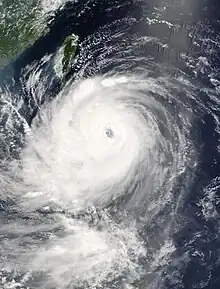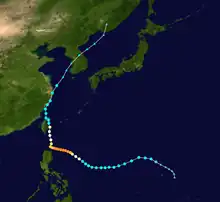Typhoon Mindulle (2004)
Typhoon Mindulle, known as Typhoon Igme in the Philippines was a typhoon that struck the Philippines, Taiwan and China in 2004, and caused extensive damage in Philippines and Taiwan.[1]
 Typhoon Mindulle | |
| Meteorological history | |
|---|---|
| Formed | June 21, 2004 |
| Dissipated | July 4, 2004 |
| Very strong typhoon | |
| 10-minute sustained (JMA) | |
| Highest winds | 175 km/h (110 mph) |
| Lowest pressure | 940 hPa (mbar); 27.76 inHg |
| Category 4-equivalent typhoon | |
| 1-minute sustained (SSHWS/JTWC) | |
| Highest winds | 230 km/h (145 mph) |
| Lowest pressure | 916 hPa (mbar); 27.05 inHg |
| Overall effects | |
| Fatalities | 56 total |
| Damage | $833 million (2004 USD) |
| Areas affected | Mariana Islands, Philippines, Taiwan, East China, Ryukyu Islands, Korea |
| IBTrACS | |
Part of the 2004 Pacific typhoon season | |
Meteorological history

Tropical storm (39–73 mph, 63–118 km/h)
Category 1 (74–95 mph, 119–153 km/h)
Category 2 (96–110 mph, 154–177 km/h)
Category 3 (111–129 mph, 178–208 km/h)
Category 4 (130–156 mph, 209–251 km/h)
Category 5 (≥157 mph, ≥252 km/h)
Unknown
The monsoon trough spawned a tropical depression on June 23 near Guam. It tracked westward, becoming a tropical storm that night and slowly strengthened as it continued westward due to vertical wind shear. When the shear abated, Mindulle quickly intensified, reaching typhoon strength on June 27 and peaking at 125 knots (144 mph) on June 28.[2] Land interaction with Luzon to its south weakened Mindulle, and the typhoon weakened as it turned northward. On July 1, Mindulle hit eastern Taiwan before accelerating to the northeast and becoming extratropical near South Korea on July 4.[1][3][4]
Impact
Mindulle caused 56 deaths and property damage estimated around $833 million (in 2004 USD) in Philippines and Taiwan.[1] In the Philippines, floods left more than 30 dead and more than 10 missing persons.[5] In southern Taiwan, flooding was the worst experienced in the previous 25 years, with some areas reaching 1.5 m of precipitation over several days, resulting in 22 deaths and 14 missing persons.[6][7] Floods and landslides occurred at various locations.[1]
References
- "Digital Typhoon: Typhoon 200407 (Mindulle)". agora.ex.nii.ac.jp. Retrieved 2021-08-15.
- "Typhoon Mindulle". earthobservatory.nasa.gov. 2004-07-02. Retrieved 2021-08-15.
- Lee, Cheng-Shang; Liu, Yi-Chin; Chien, Fang-Ching (2008-04-01). "The Secondary Low and Heavy Rainfall Associated with Typhoon Mindulle (2004)". Monthly Weather Review. 136 (4): 1260–1283. Bibcode:2008MWRv..136.1260L. doi:10.1175/2007MWR2069.1. ISSN 1520-0493. S2CID 122338343.
- Chien, Fang-Ching; Liu, Yi-Chin; Lee, Cheng-Shang (2008). "Heavy Rainfall and Southwesterly Flow after the Leaving of Typhoon Mindulle (2004) from Taiwan". Journal of the Meteorological Society of Japan. Series II. 86 (1): 17–41. Bibcode:2008JMeSJ..86...17C. doi:10.2151/jmsj.86.17.
- "Asian Disaster Reduction Center(ADRC)". www.adrc.asia. Retrieved 2022-12-22.
- Annual Tropical Cyclone Report (PDF). Pearl Harbor, Hawaii: U.S. Naval Pacific Meteorology and Oceanography Center Joint Typhoon Warning Center. 2004.
- "Timeline - Major typhoons to hit Taiwan". Reuters. 2009-08-14. Retrieved 2022-12-22.
